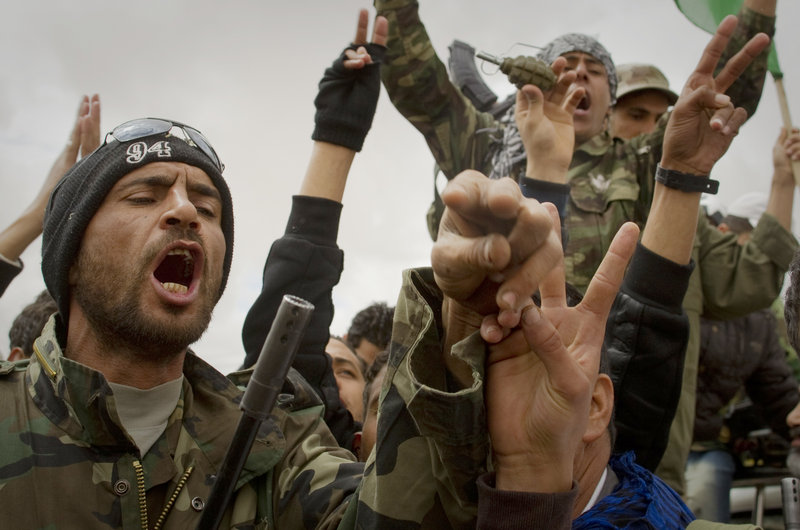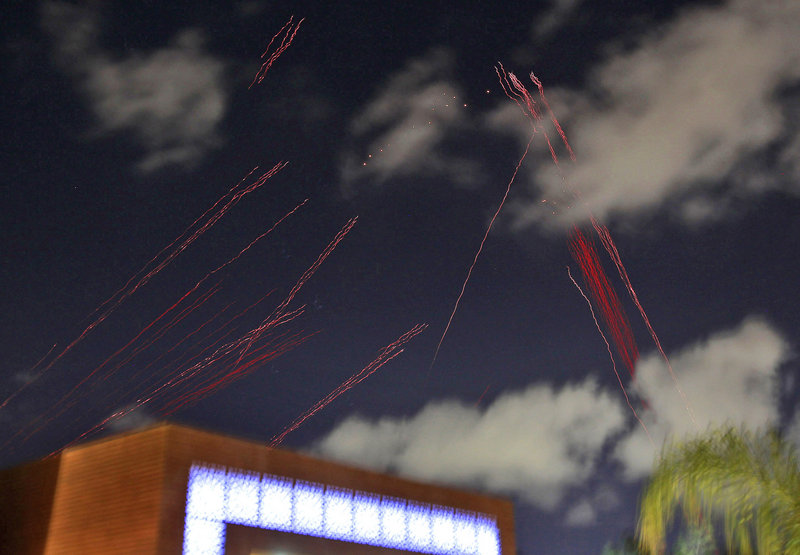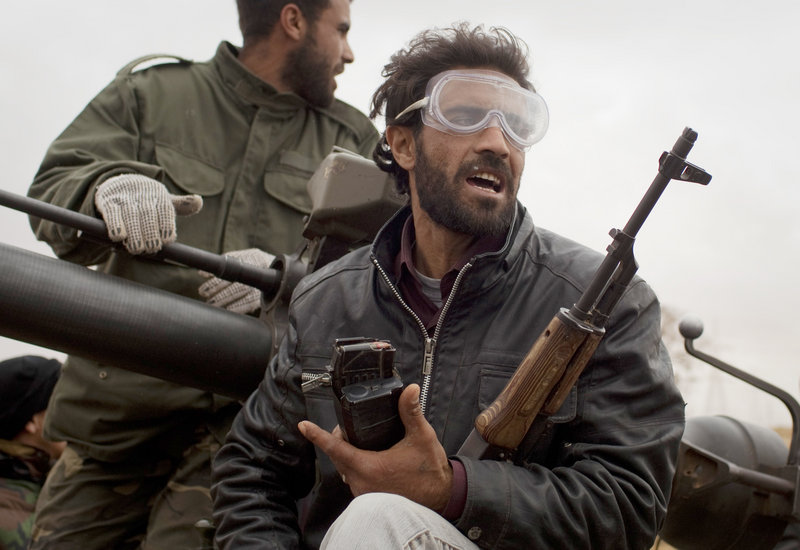ZWITINA, Libya — Coalition forces bombarded Libya for a third straight night Monday, targeting the air defenses and forces of Libyan ruler Moammar Gadhafi, stopping his advances and handing some momentum back to the rebels, who were on the verge of defeat just last week.
But the rebellion’s more organized military units were still not ready, and the opposition disarray underscored U.S. warnings that a long stalemate could emerge.
The air campaign by U.S. and European militaries has unquestionably rearranged the map in Libya and rescued rebels from the immediate threat they faced only days ago of being crushed under a powerful advance by Gadhafi’s forces. The first round of airstrikes smashed a column of regime tanks that had been moving on the rebel capital of Benghazi in the east.
Monday night, Libyan state TV said a new round of strikes had begun in the capital, Tripoli, marking the third night of bombardment. But while the airstrikes can stop Gadhafi’s troops from attacking rebel cities — in line with the U.N. mandate to protect civilians — the United States, at least, appeared deeply reluctant to go beyond that toward actively helping the rebel cause to oust the Libyan leader.
President Obama said Monday that “it is U.S. policy that Gadhafi has to go.” But, he said, the international air campaign has a more limited goal, to protect civilians.
“Our military action is in support of an international mandate from the Security Council that specifically focuses on the humanitarian threat posed by Col. Gadhafi to his people. Not only was he carrying out murders of civilians, but he threatened more,” the president said during a visit to Chile.
In Washington, the American general running the assault said there is no attempt to provide air cover for rebel operations. Gen. Carter Ham said Gadhafi might cling to power once the bombardment finishes, setting up a stalemate between his side and the rebels, with allied nations enforcing a no-fly zone to ensure he cannot attack civilians.
At the United Nations on Monday, the Security Council turned down a request by Libya for an emergency session. Libya wanted “an emergency meeting in order to halt this aggression.”
Henri Guaino, an adviser to the French president, said the allied effort would last “a while yet.”
Among the rebels, as well, there was a realization that fighting could be drawn out. Mohammed Abdul-Mullah, a 38-year-old civil engineer from Benghazi who was fighting with the rebel force, said government troops stopped all resistance after the international campaign began.
“The balance has changed a lot,” he said. “But pro-Gadhafi forces are still strong. They are a professional military and they have good equipment. Ninety percent of us rebels are civilians, while Gadhafi’s people are professional fighters.”
Disorganization among the rebels could also hamper their attempts to exploit the turn of events. Since the uprising began, the opposition has been made up of disparate groups even as it took control of the entire east of the country.
Regular citizens — residents of the “liberated” areas — took up arms and formed a ragtag, highly enthusiastic but highly undisciplined force that in the past weeks has charged ahead to fight Gadhafi forces, only to be beaten back by superior firepower.
Regular army units that joined the rebellion have proven to be stronger, more organized fighters, but only a few units have joined the battles. Many have stayed behind as officers struggle to get together often antiquated, limited equipment and form a coordinated force.
Discord also plagued the coalition. The U.S. was eager to pass leadership off, but the allies were deeply divided on the issue. Turkey was adamantly against NATO taking charge, while Italy hinted Monday it would stop allowing use of its airfields if the veteran alliance is not given the leadership. Germany and Russia also criticized the way the mission is being carried out.
Russian Prime Minister Vladimir Putin railed against the U.N.-backed airstrikes as outside meddling “reminiscent of a medieval call for a Crusade.”
In Libya, a “political leadership” has formed among the rebels, made up of former members of Gadhafi’s regime who defected along with prominent local figures in the east, such as lawyers and doctors.
The impromptu nature of their leadership has left some in the West — particularly in the United States — unclear on the intentions of the rebels that the international campaign is protecting.
The disarray among the opposition was apparent Monday.
With Benghazi relieved, several hundred of the “citizen fighters” pushed on to the west, vowing to break a siege on the city of Ajdabiya by Gadhafi forces that have been pounding a rebel force holed up inside the city. The fighters pushed without resistance down the highway from Benghazi — littered with the burned out husks of Gadhafi’s tanks and armored personnel carriers hit in the airstrikes — until they reached the outskirts of Ajdabiya.
Some of the fighters, armed with assault rifles, grenade launchers and truck-mounted anti-aircraft guns, charged to the city outskirts and battled with Gadhafi forces.
A number of rebels were killed before they were forced to pull back somewhat, said the spokesman for the rebels’ organized military forces, Khalid al-Sayah.
Al-Sayah said the regular army units that have joined the rebellion are not yet ready to go on the offensive. “We don’t want to advance without a plan,” he told The Associated Press in Benghazi. “If it were up to the army, the advance today would not have happened.”
Al-Sayah said the regular units intend to advance, but not yet, saying they are not ready. “It’s a new army, we’re starting it from scratch,” he said.
Send questions/comments to the editors.





Success. Please wait for the page to reload. If the page does not reload within 5 seconds, please refresh the page.
Enter your email and password to access comments.
Hi, to comment on stories you must . This profile is in addition to your subscription and website login.
Already have a commenting profile? .
Invalid username/password.
Please check your email to confirm and complete your registration.
Only subscribers are eligible to post comments. Please subscribe or login first for digital access. Here’s why.
Use the form below to reset your password. When you've submitted your account email, we will send an email with a reset code.